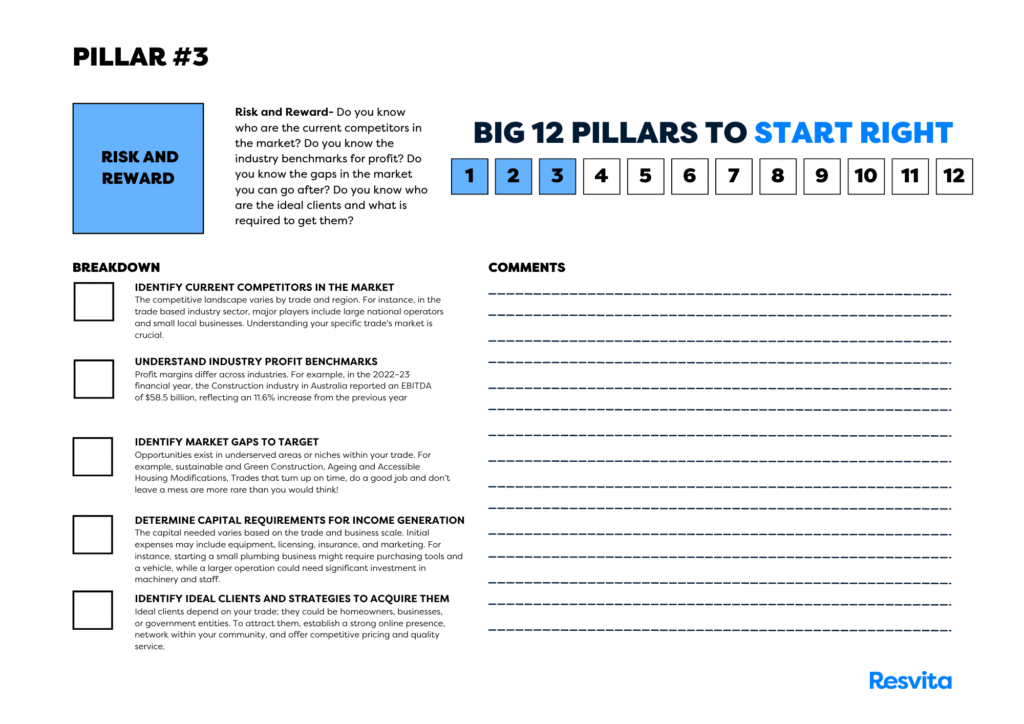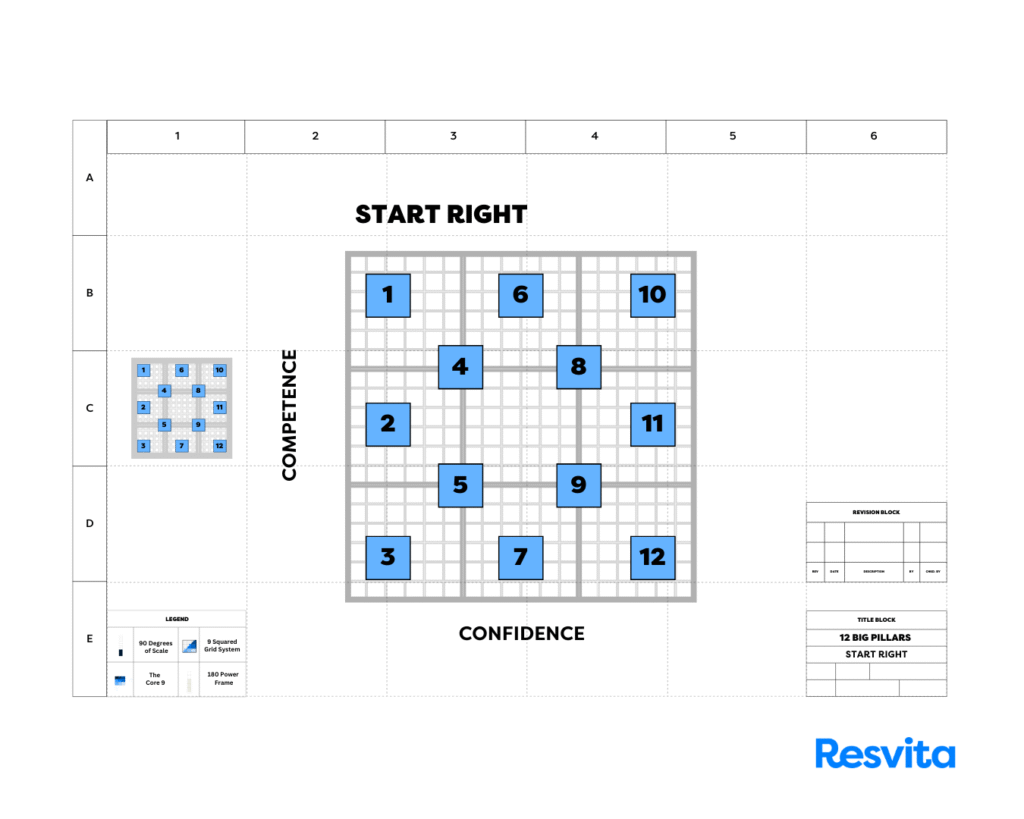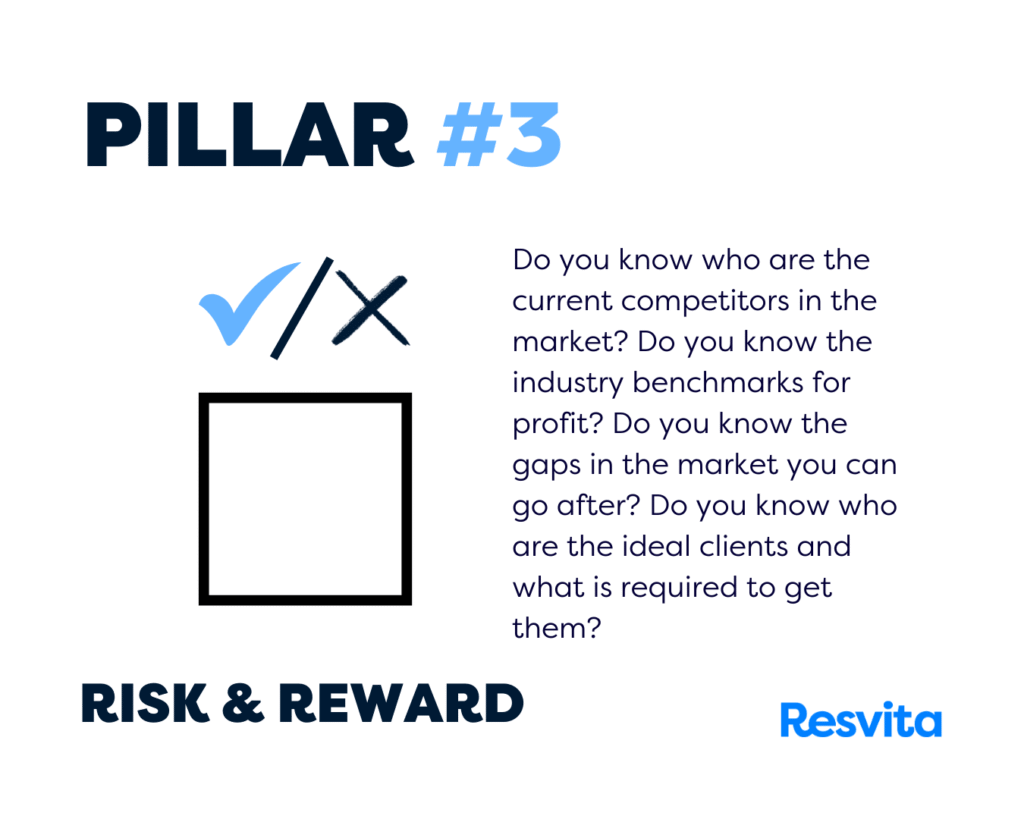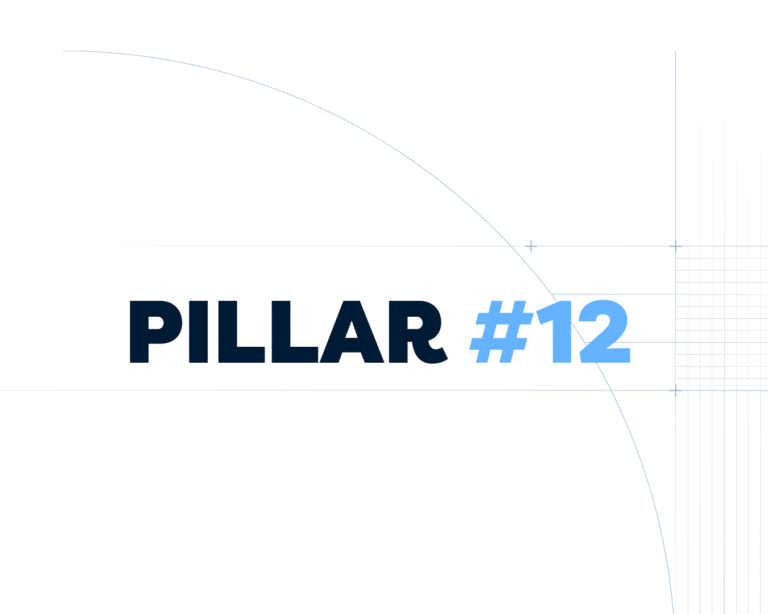Pillar 3: Risk and Reward the ResVita Way
Running a trade business is full of challenges and opportunities. Some days you win big, other days you hit setbacks. That’s the nature of working in the trades. Pillar 3 of ResVita’s 12 Big Pillars focuses on managing risk and reward for tradies so you can avoid costly mistakes while maximising the chances of success.
When you get this balance right, you protect your business against threats while positioning yourself to capture the best opportunities. It’s about making informed decisions, not leaving things to chance.
Resvita is here to make that a reality. By leveraging structured frameworks like the Core 9 and 180 Power Frame, Resvita helps tradies master financial excellence, streamline operations, and unlock long-term business success. you can find out more about those by Clicking Here.
Why risk and reward matter in trade businesses
Every job carries risk. You may underquote, face unexpected delays, or deal with unreliable clients. However, each risk also comes with the potential for reward. High-value projects, new contracts, and long-term clients can all push your business forward — if you approach them the right way.
Ignoring risk leads to unnecessary losses. Avoiding all risk means missing out on growth. The goal is to weigh risks carefully, manage them with systems, and act where the rewards justify the effort.

How to assess risk and reward for tradies
1. Know your competitors
Competitor analysis isn’t just for large companies. Tradies who understand who else is in the market can see what’s working and what’s not. By looking at competitor pricing, reviews, and weaknesses, you identify where you can stand out.
2. Benchmark your profits
Every trade has its own margin range. Carpenters often run between 10–20%, painters between 20–35%, and plumbers as high as 30%. If you don’t know your benchmarks, you risk underpricing. But if you measure against industry standards, you can check whether you’re making enough to justify the risks you’re taking.
3. Spot market gaps
Gaps exist where customers have unmet needs. It might be reliable tradies who turn up on time, eco-friendly building solutions, or rapid emergency services. These niches often carry less competition and higher reward. However, you only see them if you take time to listen to clients, research competitors, and watch industry trends.
4. Plan capital requirements
Every opportunity requires investment. Whether it’s new tools, a vehicle, or extra crew members, capital is part of the equation. Knowing what you need upfront reduces financial risk and ensures you’re prepared for growth.
5. Target ideal clients
Not every client is worth the same. By defining your ideal client — whether it’s homeowners, builders, or commercial managers — you can focus on relationships that deliver steady, profitable work. Chasing the wrong type of job carries higher risk with little reward.

The benefits of mastering risk and reward for tradies
When you actively manage risk and reward, your business becomes stronger and more sustainable.
- More control over profit: You price jobs with confidence because you understand your margins.
- Stronger positioning: Competitor awareness helps you offer what others can’t.
- Reduced uncertainty: Risk assessments let you see problems early and plan accordingly.
- Smarter growth: Opportunities are chosen based on clear reward potential, not just guesswork.
- Greater resilience: Even when setbacks happen, your systems keep you steady.
Practical example: a roofing business
Let’s say you’re running a roofing crew.
- First, you research local competitors and discover most take weeks to quote. You decide to deliver quotes within 48 hours, creating a clear advantage.
- Next, you check industry benchmarks and adjust your pricing so your margins are aligned with national averages.
- You notice a market gap in solar roofing, so you invest in training and certification.
- Before scaling, you plan out the capital needed — tools, training, marketing — and set aside funds to reduce risk.
- Finally, you target commercial property managers, who need ongoing work rather than one-off jobs.
By approaching each step with risk and reward in mind, you turn uncertainty into a structured strategy for growth.
How to start balancing risk and reward today
- List your top three competitors and identify their strengths and weaknesses.
- Compare your profit margins to industry benchmarks.
- Talk to clients and suppliers to uncover market gaps.
- Create a simple capital plan before chasing new opportunities.
- Define your ideal client and focus on building relationships with them.

Final thought
Pillar 3 of the 12 Big Pillars is about understanding the balance of risk and reward for tradies. By assessing threats, benchmarking profits, spotting gaps, and targeting the right clients, you give your business the stability it needs and the opportunities it deserves.
The tradies who succeed aren’t the ones who avoid risk altogether. They’re the ones who manage it smartly, seize the right rewards, and build businesses that thrive in any market.
So, ready to swap stress for strategy? Dive into Resvita’s Core Blueprint today and build a business that thrives, no matter the weather.
Go and complete our Blueprint to Brilliance Scorecard to start to really uncover
– What’s Currently Working and How to Get More
– What’s Not Working and How to Fix It
– What is needed to get to the next level!
It takes less than 5 minutes to complete!
Click Here to go to the scorecard









